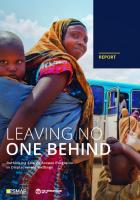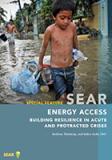Publications
Forced displacement is increasingly becoming a major development challenge. As the overwhelming majority of the forcibly displaced persons (FDPs) settle in developing countries, this poses a strain on the local resources and capacity. Displacement crises also present considerable political challenges for host governments.
FDPs often experience minimal access to energy, and when they do, they often use energy solutions that are costly, inefficient, unsafe, and harmful to the environment. Nevertheless, safe, affordable, and reliable energy is essential to day-to-day living, and this is even truer in displacement settings. In these contexts, energy is conducive to essential services such as education or healthcare, to increased security, and to improved socialization. The combined effect of this helps the forcibly displaced to increase their quality of life in the face of their extensive traumas.
The report outlines a set of recommendations to address the key barriers that impede optimal energy practices in displacement settings. Such recommendations represent sectorial building blocks meant to work synergically to reshape energy access interventions in a more inclusive, sustainable and effective manner. Furthermore, the report highlights the potential for the World Bank and the Energy Sector Management Assistance Program (ESMAP)’s Leaving No One Behind program to lead the efforts needed to tackle the displacement crisis as a development challenge.
Energy Sector Management Assistance Program. 2022. Leaving No One Behind: Rethinking Energy Access Programs in Contexts of Displacement. Washington, DC: World Bank. License: Creative. Commons Attribution CC BY 3.0 IGO
http://documents.worldbank.org/curated/en/099530012072237207/P17514905315bf0a40b3d4071242447e86c

